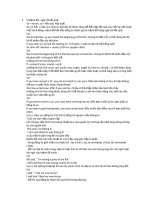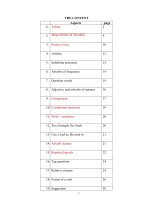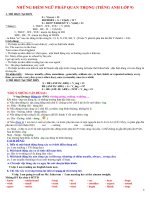NGU PHAP TIENG ANH 9 CHUAN
Bạn đang xem bản rút gọn của tài liệu. Xem và tải ngay bản đầy đủ của tài liệu tại đây (269.06 KB, 77 trang )
ĐỀ CƯƠNG ÔN TẬP TIẾNG ANH 9
CHƯƠNG 1: CÁC THÌ TRONG TIẾNG ANH
1.Thì hiện tại đơn
a.Với động từ Tobe:
- He/ She /It /Mai
is :
- They / You/ We / Mai and Lan
are :
I
am :
* form. (+) S + Be {+ adj (N)/} = C (Complement) bổ ngữ *eg: I am a good teacher
(-) S + Be + not + C
He is not a student
(?) Be + S + adj
Are they tall ?
1
b. Với động từ thường:
* form. (+) He/ She/ It + V- s/es + O.
* eg: He watches TV every night.
(+) You/ We/ They / I + Vinf + O
They watch TV
Câu phủ định và nghi vấn ta phải mượn trợ động từ do/does
(-) He/ She/ It /Nam + does + not + V- inf + O She does not watch TV
(-) You/ We / They / I + do + not + V- inf + O
(?) Does + He/ She/ It + V- inf + O ?
Do you watch TV?
(?) Do + They / You/ We + V- inf + O ?
c. Cách dùng : Diễn tả một hành động:- thường xuyên xảy ra- hành động lặp đi lặp lại
Các trạng từ thường xuyên đi với thì hiên tại đơn (Adv)
never,sometimes,often, usually, frequently, always, every (day/week/night/month…)
2
Trạng từ chỉ sự thường xuyên luôn đi trước động từ thường, nhưng đi sau động từ TO BE và các trợ
động từ
* eg: He always watches TV every night.
They often watch TV
She does usually not watch TV
Do you often watch TV?
* eg: Nam is often late for class.
- Một sự thật hiển nhiên.
* eg: The Earth goes around the Sun. (Trái đất quay quanh mặt trời)
2.Thì hiện tại tiếp diễn.
* form: (+) S + Be + V-ing + O
(Be = am/are/is)
3
(-) S + Be + not + V-ing + O
(?) Be + S + V-ing + O
* Adv : now, at the moment, at present, right now
* eg: Nam is reading book now
Nam and Lan are listening to music at this moment.
What are you doing now ?
* Cách dùng:
- Diễn tả một hành động đang xảy ra tại thời điểm nói
3.Thì hiện tại hoàn thành.
* form:
(+) S + has / have + V- ed (pp) + O
(-) S + has /have + not + V- ed (pp) + O
4
(?) Has / have + S + V- ed (pp) + O ?
PP = Past Participle Quá khứ phân từ
QTắc V-ed : BQT xem cột 3 (V3)
*Adv: just, recently, ever, never, already, since, for, so far, yet, up to now, lately, twice, three
times, many times,. not…yet.
eg: I have just seen my sister in the park.
*Note: (just,ever, never, already) đi sau have/has
She has finished her homework recently.
( recently,lately,yet) đặt cuối câu.
*Cách dùng:
- Diễn tả một hành động vừa mới xảy ra
- Hành động xảy ra trong quá khứ mà không rõ thời gian
- Hành động xảy ra trong quá khứ và còn liên quan đến hiện tại còn tiếp diễn đến tương lai.
- Hành động xảy ra lặp đi lặp lại nhiều lần
5
4Thì quá khứ đơn
a.Với động từ Tobe:
* I/ He / She / It (Nam)
Was
*eg: Nam was absent from class yesterday
* You / We / They (Nam and Lan) Were Were Minh and Mai in hospital last month?
b.Với động từ đơn:
*form: (+) S + V- ed/(V2 BQT) + O
*eg: Tom went to Paris last summer.
Câu phủ định và nghi vấn ta phải mượn trợ động từ did
(-) S + did not + Vinf + O He did not watch TV last night.
(?) Did + S + Vinf + O ? Did you go to HCM city two days ago?
Adv:
Yesterday, ago, last (week/month/ year/ … )
c.Cách dùng :
6
- Diễn tả một hành động đã xảy ra trong quá khứ và chấm dứt hẵn trong QK
5.Thì quá khứ tiếp diễn
* form (+) S + Was/ were + V- ing + O
(-) S + Was/ were + not + V- ing + O
(?) Was/ were + S + V- ing + O?
Cách dùng :
- Diễn tả một hành động đang xảy ra trong quá khứ tại 1 thời điểm xác định cụ thể.
- => I was doing my homework at 6 p.m last Sunday.
- Diễn tả hai hay nhiều hành động cùng xảy ra trong quá khứ. (While)
- => I was cooking while my sister was washing the dishes.
- Diễn tả một hành động xảy ra thì một hành động khác đến cắt ngang.(When)
7
- => When the teacher came, we were singing a song.
6.Thì quá khứ hoàn thành.
* form : (+) S + had + V- ed (pp)/ V3BQT + O.
(-) S + had + not + V- ed (pp)/ V3BQT + O.
(?) Had + S + V- ed (pp)/ V3BQT + O.?
* eg: We had lived in Hue before 1975.
After the children had finished their homework, they went to bed.
= Before the children went to bed, they had finished their homework
*Cách dùng:
- Diễn tả một hành động xảy ra và đã hoàn thành trong quá khứ.
(- Trong câu có hai hành động thì hành động xảy ra trước dùng ở quá khứ hoàn thành còn hành
8
động sau dùng thì quá khứ đơn )
7. Thì tương lai thường.
* form :
(+) S + Will + Vinf + O. (He will = He’ll) * eg: I will call you tomorrow.
(-) S + Will + not + V + O (will not = won’t) He’ll come back next week.
(?) Will + S + Vinf + O ?
Will Nam play soccer?
*Adv. Tomorrow, next (week/ month …), soon
*Cách dùng :
- Diễn tả một hành động sẽ xảy ra ở tương lai.
8. Thì tương có dự định.(Be going to)
* form: (+) She / He / It + is + going to + V(inf) + O.
(-) They / You / We + are + going to + V(inf) +O.
9
(?) I + am + going to + V(inf) + O.
*eg: My father is going to go to visit Ha long Bay .= My father is going to visit Ha long Bay.
We aren’t going to the movies.
Are you going to write a letter ?
* Cách dùng :
- Diễn tả hành động sắp sửa xảy ra hoặc một dự định sắp tới. Một dự định, kế hoạch
9. Bài tập .
A. Chia động từ trong ngoặc ở thì thích hợp.
1.Be quiet ! The baby ( sleep)
2. The sun ( set) in the West.
3.Mr Green always ( go) to work by bus.
10
4. It ( not rain ) in the dry season.
5. They ( have ) lunch in the cafeteria now.
6. My little sister ( drink) milk every day.
7. The doctor sometimes ( return) home late.
8. He ( write) a long novel at present.
9. Look ! The bus ( come).
10. The earth (move) around the sun.
11.Sometime ( smell) good in the kitchen now.
12.His uncle ( teach) English in our school five years ago.
13. The old man( fall) as he (get) into the bus.
14. When I saw him, he (sit) asleep in a chair.
11
15. There (be) a lot of noise at the fair yesterday.
16. It (take) me 5 minutes to walk to school last year.
17.They ( not speak) to each other since they quaralled
18. I (try) to learn English for years, but I ( not succeed) yet
19.I (not see) her since last week.
20. John( do) his homework already.
21.The train (start) before we arrived at the station.
22. There (be) an English class in this room tomorrow evening.
23. The film already (begin) when we got to the cinema.
24. You (stay) at home tonight?
25.I( be) twenty years old next June.
12
26.Where are you?- I’m upstairs. I (have) a bath.
27.All of them (sing) when I( came).
28.What you( do) at 7 p.m yesterday?
29. Where you ( spend) your holiday last year?
30. Why didn’t you listen while I (speak) to you?
II. Chia động từ trong ngoặc
1.A: I …………( not see) Andrew for weeks.
B: Nor me, It’s weeks since I last …….( see) him.
2.A: What……( you/do) last night?
B: Well, I ……..( be) very tired, so I …..( go) to bed very early.
3.A: ……….( you/ meet) Julie recently?
13
B: Yes, I …….(see) her a few days ago.
4. A: Are you still playing tennis?
B: No, I …..( not be) able to play tennis since I (break) my arm.
5. A: What part of birmingham. ( you/live) when you …..(be) a student?
B: A place called Selly Oak ………( you/ever/be) there?
CHƯƠNG 2: CÂU ĐIỀU KIỆN
I. Lý thuyết.
- Một câu điều kiện thường có hai mệnh đề là mệnh đề chính (Main clause)và mệnh đề phụ(If
clause) . Mệnh đề phụ (If clause)có thể đặt trước hoặc sau mệnh đề chính.(Main clause)
- Có 3 loại câu điều kiện:
14
1.Câu điều kiện 1: điều kiện có thể xảy ra .
* form:
MỆNH ĐỀ IF
Simple present( HTđ)
If + S + V(HT)
*
eg: If I have
+O ,
you.
MỆNH ĐỀ CHÍNH
Simple future( TLđ)
S + Will/ Shall + V(inf) + O
John usually walks to school if he has enough time.
If she eats much, she will be over weight.
2. Câu điều kiện 2 : điều kiện không có thật ở hiện tại.
* form :
MỆNH ĐỀ IF
MỆNH ĐỀ CHÍNH
time, I shall visit
15
Past simple (QKĐ) ,
would/could/ should/ might + Vinf
If + S + V–ed (V2) + O, S + would/ could + V(inf) + O
*Note: Tobe dùng Were cho tất cả các ngôi ( trong Mệnh đề If)
* eg: If I had much money , I would buy a new bicycle.
If you practised English every day , you could speak it fluently.
If I were you, I would not tell him about that.
3. Câu điều kiện 3: điều kiện không có thật ở quá khứ. (Học ở lớp 10,11,12)
* form:
MỆNH ĐỀ IF
MỆNH ĐỀ CHÍNH
Thì quá khứ hoàn thành
would, could, might + have +PP
16
If + S + had + V-ed(V3) +
S + would/ could + have + V-ed(V3) + O
O,
* Eg: If he had driven more carefully, he could have had fewer accidents.
4. Note: Unless = if…not ( nếu không, trừ khi )
Eg: Unless it rains, we will go to the movies.
= ( If it does not rain , we will go to the movies)
5. Bảng tóm tắt câu điều kiện.
Loại Mệnh đề phụ (IF clause)
Mệnh đề chính (Main clause)
1
Will
V(HTĐ)
Can
+ V (inf)
17
2
3
Be (is/am/are)
Đt thường
V inf/ V(s/ es)
Quá khứ đơn (bàng thái)
Be WERE
Đt thường V- ed /( V2)BQT
QKHT (bàng thái)
Had + V- ed(V3) BQT
II. Bài tập.
A.Chia động từ trong ngoặc.
Shall
May
Could
Would
Should
Might
Could
Would
Should
+ V (inf)
+ have + V- ed( pp)
18
1. If you ( go) __________away, please write to me.
2. If you ( be)__________ in, I should have given it to you.
3. If he (eat) __________another cake, he will be sick.
4. I ( not do ) __________ that if I (be) __________you.
5. If he (take) __________my advice, everything can go well.
6. I would have come sooner if I ( know)__________ you were here.
7. He never does homework. If he( do)_____ his homework, he(not worry)____about his exam.
8.It’s too bad we lost the game. If you (play)__________ for us, we( win)__________.
9.What you (do) __________if she refuses your invitation?
10. If today (be) __________Sunday, we (go)__________ to the beach.
11. Unless they (pass) __________their examinations, they would join the army.
19
12. You (be) __________ill if you drink that water.
13. If Tom (go)__________ to bed earlier, he would not be so tired.
14. Had we known your address, we( write) __________you a letter.
15. If it’s raining heavily, we (not go) __________for a donkey ride.
16. If he (try)__________ hard, he’ll pass the examination.
17. I could understand the French teacher if she (speak)__________ more slowly.
18.If she (not be)__________ busy, she would have come to the party.
19. If I (finish) __________the work in time, I ( go)__________ to the football game.
20. If you( see) __________Mary today, please ( ask) __________her to call me.
B.Viết lại những câu sau sao cho nghĩa của câu không thay đổi.
1. That man doesn’t work hard.He can’t earn more money.
20
2.I don’t tell him the answer because he is from home.
3. My friend and I don’t have enough money , so we will not buy a house of our own.
4. The weather isn’t better now, so we can’t go for a walk.
5. I don’t know his address, and I don’t give it to you.
6.He does not work slowly enough, so he makes many mistakes.
7. I am not sent to prison. She doesn’t visit me
8. I don’t win a big prize in a lottery, so I don’t give up my job.
9. The doctor can’t see many patients because he is so late.
10. We don’t visit them in Hanoi because tickets are expensive.
CHƯƠNG 3. CÁCH DÙNG ĐỘNG TỪ “ WISH”
21
I.
Lý thuyết.
- Động từ Wish = If only ( ao ước) thường dùng để diễn tả những ước muốn, những điều không
có thật hoặc rất khó thực hiện. Có 3 loại câu ước.
1. Future wish:( ước muốn ở tương lai)
* form: S1 + wish + S2 + would/ could + V(inf) + O.
If only + S + would/ could + V(inf) + O
* eg:- I wish I would be an astronaut in the future.
- Tom wishes he could visit Paris next summer.
- If only I would take the trip with you next Sunday.
2. Present wish( ước muốn ở hiện tại)
* form: S1 + wish + S2 + V- ed + O
22
Were
+ adj / n *Note: Tobe dùng Were cho tất cả các ngôi
Could
+ V (inf)
* eg:- I wish I were rich (but I am poor now)
- I can’t swim. I wish I could swim.
- If only Ben were here ( but Ben isn’t here. I wish he were here)
- We wish that we didn’t have to go to class today ( but we have go to class today)
3. Past wish: ( ước muốn ở quá khứ) (Học ở lớp 10,11,12)
* form: S1 + wish + S2 + had + V- ed (pp) + O
could have + V- ed(pp) + O
* eg :- I wish I hadn’t failed my exam last year.
( I failed my exam )
23
- She wishes she had had enough money to buy the house.
( she didn’t have enough money to buy it )
- If only I had met her yesterday.
( I didn’t meet her )
- She wishes she could have been there.
( she couldn’t be there)
II.
Bài tập :
A. Chia động từ trong ngoặc.
1. She wishes her father ( be)_______________ here now to help her
2. I wish they ( visit) _______________us when they were in town.
3. I wish someone ( give) _______________ me a job next month.
24
4. If only I ( can take) _______________the trip to Hanoi with her next summer.
5. I wish they ( know) _______________the truth yesterday.
6. I wish I (see) _______________ that film on TV again.
7. We wish she (be) _______________ our teacher of English.
8. My brother wishes he (not waste) _______________ time when he was young.
9. They wish they (come) _______________ to class on time yesterday morning.
10. I wish I ( spend) _______________my last summer vacation in the mountains.
11.I wish she (come) _______________ to see me yesterday.
12.If only I ( have) _______________more time to do this job.
13.He missed an exciting football match on TV last night. He wishes he (watch) ____________ it.
14.I wish you ( not give ) _______________them my phone number yesterday.
25









